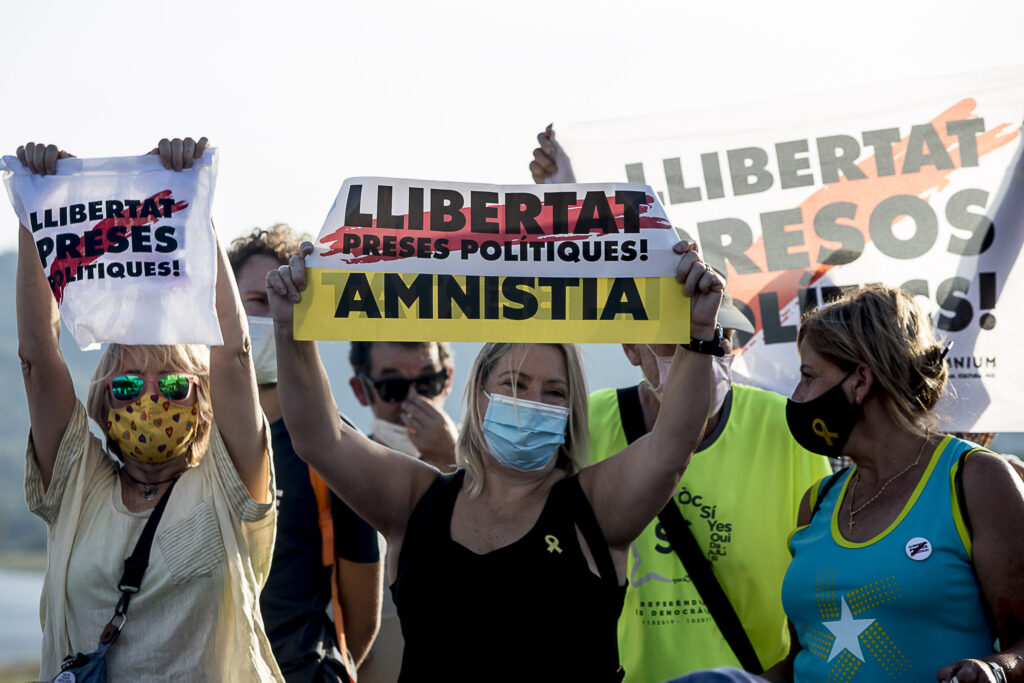14.10.2020 - 12:01
|
Actualització: 14.10.2020 - 14:01
Catalonia’s political prisoners have posted several messages on Twitter to remember the date of 14 October 2019, when Spain’s Supreme Court issued the sentence against them for organizing (or not opposing to) the 2017 independence referendum. Deposed vicepresident Oriol Junqueras, for example, was sentenced to 13 years behind bars on sedition charges, although he had already served two years in provisional detention. Junqueras writes that they won’t step back until independence is achieved.
Avui fa un any d'una sentència que portava els nostres noms però que sentenciava a tot un país. Seguim forts, ferms i més convençuts que mai. Persistirem fins al final, fins a la #RepúblicaCatalana! Fins a la victòria!
— Oriol Junqueras 🎗️ (@junqueras) October 14, 2020
Eight other former ministers and leading activists in 2017 were also convicted to around a decade in prison on sedition charges. All nine are searching for a way to annul or shorten their punishments. All nine are pending an appeal before the Spanish Constitutional Court and in the likely event that it fails, they will take their struggle to the European Court of Human Rights in Strasbourg.
Given that this path is expected to be extremely long –up to five years until a potential favorable ruling, say commentators – some kind of shortcut through politics could be an option, if there is a political will to solve the problem.
Amnesty, pardoning, code reform
The pro-independence camp has found consensus in demanding an amnesty for all those involved in the referendum case, both those imprisoned and those in exile. They put forward this petition in the talks between the Catalan and Spanish governments in February, with no affirmative response. The Spanish congress would have to pass an amnesty law, something unlikely – this only happened after the Franco dictatorship in 1977, when Spain was transitioning to a democracy.
A more realistic option might be a pardoning – this is decided exclusively by the Spanish government, which is officially “considering” pardon requests for all nine, made by members of the civil society. Most political prisoners have rejected this option, on the grounds that this would mean acknowledging they committed a crime.
The third way that could see their sentences reduced is the reform of the criminal code that the Socialist-led Spanish cabinet is working on. They plan to modify the crime of sedition, among others, which would force the Supreme Court to redo the sentence – given that some incarcerated leaders are also facing a conviction for misuse of funds and without more details on the extent of the reform, it remains to be seen whether the three years they have already served would be enough. Such reform has raised skepticism among the jailed leaders and the Catalan government, who see it as a “patch.”
Political pressure
One way or another, the Spanish executive might be politically forced to make a move towards shortening the sentences, because they are very likely to need at least one Catalan pro-independence party in congress to keep their majority in the chamber and pass the 2021 budget. Yet, this measure would be unpopular in Spain, not only among the right-wing opposition parties, but also within the Socialists.
As they are waiting for developments, the defense teams of the politicians and activists have been struggling to get as many temporary permits to leave penitentiaries as possible. In January 2020, activists Jordi Sànchez and Jordi Cuixart were the first ones to get permits, because they had already served a third of the sentence. Six of the leaders were allowed to attend a Catalan parliamentary committee after being summoned in late January. Between February and early March, they were all granted regular leaves on weekdays to work, care for relatives and volunteer, but always sleeping in prison.
This was interrupted by the peak of the pandemic in the spring, when they were not allowed to use such permits for weeks. On July 14, 2020, the Catalan government, managing penitentiaries, granted ‘low category’ prisoner status to all of them, meaning that not only were they able to work on weekdays, but also spend all their weekends at home.
Permits revoked
Yet, Spain’s prosecutor appealed and ultimately the Supreme Court provisionally revoked ‘low category’ status and regular permits for seven of the jailed leaders in late July while taking a final decision on the matter – only Carme Forcadell and Dolors Bassa are still able to spend time out on weekdays. The court is still considering their status at the moment and relatives have complained about their isolation.
On September 23, the government in Madrid announced they would consider the pardon requests and that they would reform the criminal code. Yet, so far, one year has passed by since the sentencing – and the riots that followed – and their situation continues unmoved.
With a Catalan election round the corner and Spain’s cabinet needing a budget passed for 2021, things could suddenly change, but so far the light at the end of the tunnel for Oriol Junqueras and the rest is between 2026 and 2030.


